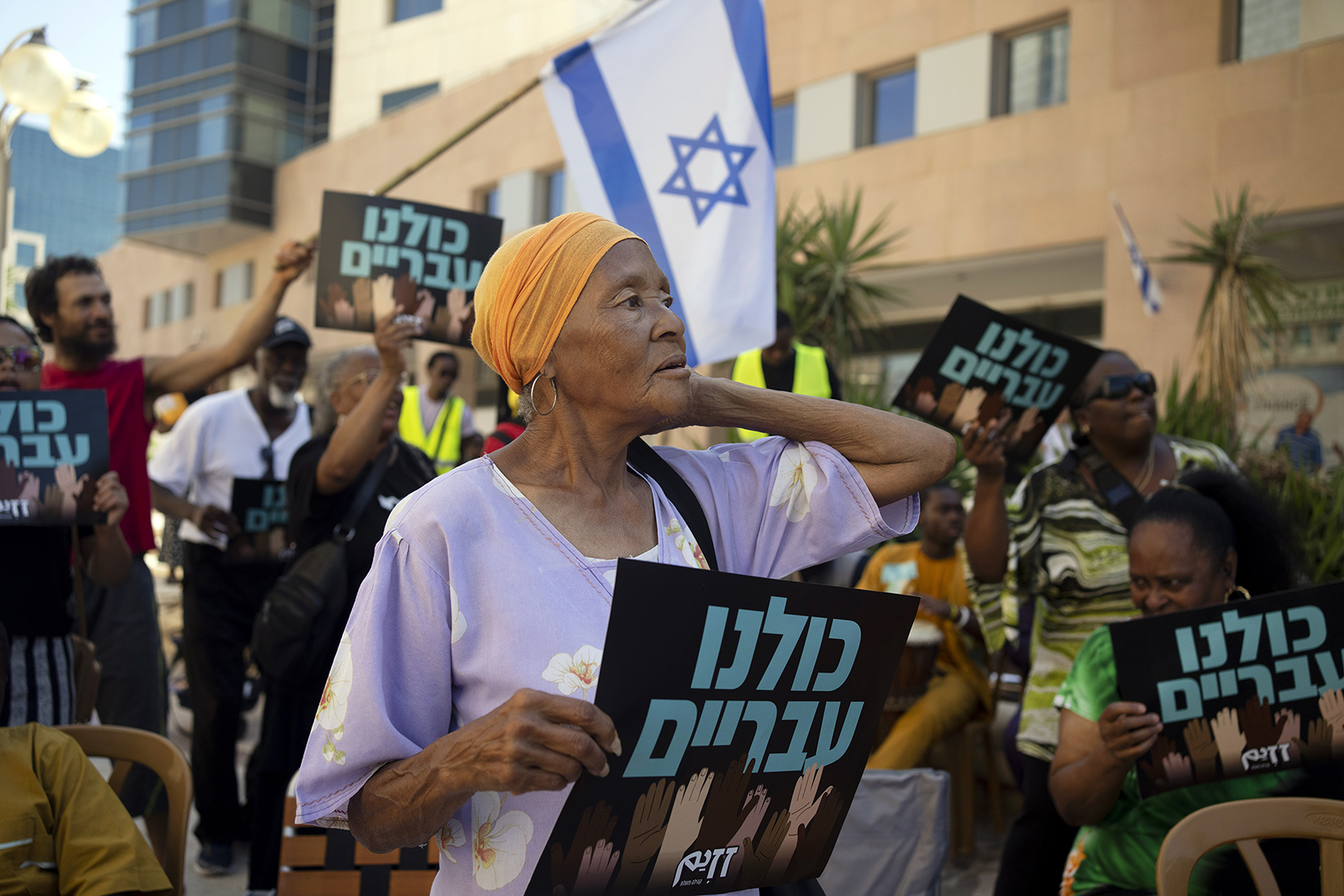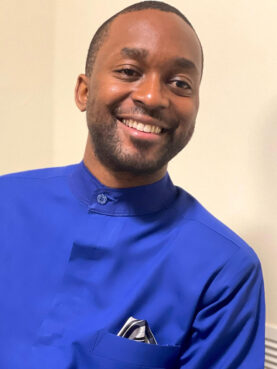
(RNS) — The small African Hebrew Israelite community in Israel’s Negev Desert last month celebrated a major milestone in its struggle for recognition in the Jewish state, as more than 100 members seem to have avoided deportation.
In a court battle spanning decades, Israeli judicial authorities ruled a majority of residents with undocumented or unclear status in the country will be placed on a pathway toward permanent residency and potential citizenship.
“It’s been really rough. We are happy for this day,” Dawn Hercules, who, along with her eight children, had faced deportation before the court ruling, told RNS.
Hercules said she moved from Atlanta to Israel in 1998, seeking a sense of freedom and community that many in her movement say they’ve found after moving from the United States — where their ancestors were enslaved — to the holy land. However, her family and others who identify as African Hebrew Israelites are not considered Jewish by the Israeli government, meaning they are not given citizenship under the country’s Law of Return.
Because of her undocumented status, she said she has been unable to find jobs outside of the Hebrew Israelite enclave and is locked out of the Israeli health care system.
“It’s an enormous stress,” Hercules said. “Think about having no medical care, and any medical care we do get, we pay full price for. That presents a financial hardship when we don’t have normal-paying jobs.”

Members of the African Hebrew Israelite community recently in court in Israel. (Photo courtesy Ashriel Moore)
The African Hebrew Israelites of Jerusalem has about 2,000 members living in Israel currently, according to the group’s spokesman, Ashriel Moore. They follow the late Ben Ammi Ben-Israel, an African American spiritual leader born in Chicago as Ben Carter, who believed African Americans were the true descendants of the biblical Israelites who found themselves in Africa after their expulsion by the Romans. Hebrew Israelites largely do not view their movement as a branch of Judaism.
The group is decidedly separate from other U.S.-based groups that style themselves as Hebrew Israelites, some of which espouse antisemitic views and have been deemed hate groups by the Southern Poverty Law Center. Ben-Israel’s movement has long distanced itself from such views.
The Hebrew Israelites endorse strict veganism, abstinence from alcohol and fasting on the Sabbath, among other traditions.
In the 1960s, Ben-Israel led hundreds of his followers from Chicago, first to Liberia and then to Israel, where they settled in the small city of Dimona in the Negev Desert. In the area previously known for Israel’s nuclear weapons research program, his followers established the Peace Village, where most of the community resides in Israel.

Ashriel Moore. (Courtesy photo)
However, since their first arrival in Israel in 1968, the group has faced a precarious reality. Back then, the country did not have a legal definition for who is a Jew, and therefore who has access to citizenship. Moore said many of the first immigrants received citizenship because of their association with the ancient Israelite identity but were later stripped of it in 1970 when Israel amended the Law of Return to include only those whom it regards as Jews.
Nonetheless, the small community remained steadfast in its desire to stay and has grown over the years. Moore said the community’s Peace Village in Dimona is the largest enclave of African Americans living outside the U.S.
Many Hebrew Israelites renounced their American citizenship upon moving to Israel, leaving them effectively stateless while they clashed with the Israeli government over their status.
They are, however, largely well-received by Israeli society. The community has been visited and praised by Israeli leaders such as then-President Shimon Peres, who said in 2008, “Your community is beloved in Israel. … You give the country happiness and song and hope for a better world.”
In 2012, Prime Minister Benjamin Netanyahu visited the community during its New World Passover holiday, which celebrates Ben-Israel’s exodus from America to Israel, and spoke in favor of their integration into Israeli society.
“We have a very beautiful relationship with not only the wider Jewish community in Israel, but also all the other communities in Israel,” Moore said. “There are not only Jews, but Druze, Bedouins, Christians and Bahais. We have beautiful relationships with all of these communities because we come in peace. We’ve never had issues with the Israeli public. It’s always been with the Israeli government.”
In the 1990s, under pressure from the U.S. Congressional Black Caucus, Israel agreed to give many Hebrew Israelites temporary residency, which allowed them to work and receive government services. And in 2002, during the second intifada, an African Hebrew Israelite musician was killed at a bat mitzvah by a Palestinian gunman. In the aftermath, the community received an outpouring of interest and support, and another agreement was made with the Interior Ministry to give most permanent residency.
Ben-Israel received full Israeli citizenship in 2013, before his death in 2014, and most followers gained legal status during those past campaigns.

Members of the African Hebrew Israelite community dance during a procession past their elders and community leaders during New World Passover celebrations marking the group’s exodus from the United States, in Dimona, Israel, Friday, June 2, 2023. The community observes an interpretation of biblical laws formulated by their late founder that includes strict veganism, abstention from tobacco and hard alcohol, fasting on the Sabbath, and a ban on wearing synthetic fabrics. (AP Photo/Maya Alleruzzo)
However, that progress stalled. In 2015, many of the residents still without status asked the Interior Ministry to move along the process. In 2021, 130 of them received notices denying their requests, and about 50 were issued deportation orders.
According to The Associated Press, the Interior Ministry said those facing deportation had never before appeared on lists given by African Hebrew Israelite leaders and that some had entered Israel recently. However, the community said the government reneged on previous promises and appealed the decision.
“I can’t say I have any regrets, because I think things happen in life,” Hercules said. “But I can say I’ve been disturbed. When you have children who seemingly don’t have a future in the land where they were born, you know, that’s discouraging. Keeping them motivated is your main goal so that they don’t become just overcome with despair. It’s been a challenge.”
The 2021 notices were particularly shocking, as many Hebrew Israelites believed they had made significant strides to integrate into Israel’s social fabric.
“We’re the only community to serve per amount of people per community 100% in the IDF.” Moore said “… We’ve represented Israel on multiple occasions not only as ambassadors of good will, but also in international affairs like the Eurovision contest.” Dimona-born Hebrew Israelite Eddie Butler has twice represented Israel in the international Eurovision Song Contest.
And despite the positive court decision the families were informed of last month, the struggle is not over. Hercules said only five of her eight children — all of whom were born in Israel — received temporary residency. The status of the other three, all minors, is still unresolved, and she is appealing the court for clarification.
Moore said that although the community welcomes the court’s decision, noting it is life-changing for some, it has been accepted with an air of suspicion. Granting temporary residency means the visas include medical insurance and permission to work, but they are up for review every one to two years and not guaranteed to be renewed. He said he believes the decision may have been a move to preempt a judge from ruling in accordance with the 2003 agreement and directly granting permanent residency and a pathway to citizenship.
“I see it as a cynical move, but nonetheless one that is in our favor, because we’re going from talking deportation to talking what level of status should these people have in this room,” Moore said. “So, we can fight that from here without having the threat of deportation above their heads, which wouldn’t even allow them to function.”
This story has been updated to clarify the African Hebrew Israelites’ history and to correct an earlier version’s reporting on the group’s attitude toward polygamy, which it no longer supports. RNS regrets the error.
